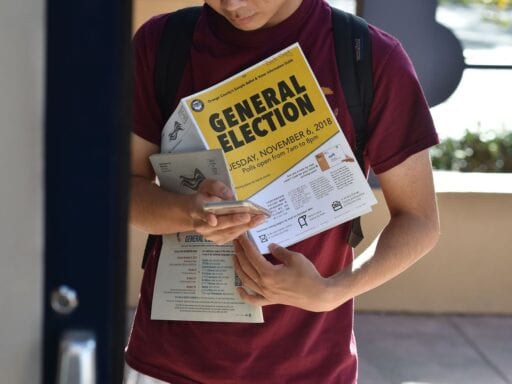Could the youth vote become one of the big stories of the 2020 election?
More than four out of five young Americans are planning to vote in 2020, according to a new poll — but nearly as many say the US’s democracy is “broken.”
The poll, conducted by Vice News/Ipsos among 1,043 18- to 30-year-old Americans September 30 to October 8, found 76 percent of those polled were “very likely” to vote in the presidential election, and another 8 percent were “somewhat likely.”
This would be a huge uptick in participation from this age group. Just four years ago, a Harvard IOP poll conducted October 7-17 of 2,150 young adults age 18-29 found that only 49 percent of respondents said they would “definitely be voting” that year. This tracked well with what actually happened. According to the Brookings Institution, 50 percent of this age group ended up voting in the 2016 general election. And in 2008, considered a banner year for youth turnout, only around 52 percent of this cohort turned out to vote.
All this is to say, if 84 percent of young people actually turned out to vote (or even a much lower share), that would be a seismic shift in voting behavior.
/cdn.vox-cdn.com/uploads/chorus_asset/file/21977064/83430949.jpg.jpg) Joe Raedle/Getty Images
Joe Raedle/Getty ImagesThe poll also underlines a defining characteristic of the 2020 election: It could be a year of historic democratic turnout, even as Americans’ faith in their elected leaders, fellow citizens, and electoral processes continues to fall.
Nearly three-quarters of respondents said they strongly or somewhat agreed that “our democracy is broken.” Overwhelming majorities of those polled said their were structural issues with things like voter registration and hurdles to casting a ballot.
Nearly as many, 65 percent, agreed with that phrase and that “political parties and politicians don’t care about people like them.” Despite their stated disillusionment with both parties, over half of respondents are hoping former Vice President Joe Biden wins the election and only 23 percent said the same for President Donald Trump.
Concerns about the Electoral College are resonating as well, with nearly 60 percent of respondents indicating some degree of concern “that the electoral college winner will be different than the popular vote winner.” Young voters track evenly with the majority of American adults, who say the US should “amend the Constitution so the candidate who receives the most votes wins.”
Young people are frustrated by barriers to voting
Vox’s Karen Turner has reported on the often overlooked reasons young people don’t vote, writing that while “narratives around the youth vote have long centered around apathy” we are ignoring the ways that young people’s lives “are not set up for [voting]”. Turner adds that registering to vote is not always a simple process and figuring out where to vote and what items you may need to bring can be overwhelming to young people who have moved away from home for the first time for a job or for higher education.
This sentiment is clear in Vice and Ipsos’s poll — over 70 percent of poll respondents agreed that the government needs to modernize voting and voter registration and that “Election Day should be a national holiday.”
We’re already seeing long lines, a form of voter suppression, across the country as early vote begins. In Texas, Gov. Greg Abbott is accused of making it inordinately difficult to drop off ballots by only allowing one drop off box for mail in ballots per county. For context, Texas’s Harris County is home to 4.7 million people.
Harris County is bigger than the state of Rhode Island, and we’re supposed to have 1 site? This isn’t security, it’s suppression. Mail ballot voters shouldn’t have to drive 30 miles to drop off their ballot, or rely on a mail system that’s facing cutbacks. https://t.co/IeKwzdB0Hb
— Lina Hidalgo (@LinaHidalgoTX) October 1, 2020
Young Americans are tuned in to this — 59 percent of them say that they’re concerned about voter suppression and 64 percent are concerned that their votes won’t be counted if they are sent by mail. Worries about mail ballots may have to do with Trump’s attacks on vote by mail, which have sparked widespread concern, according to reporting by the New York Times.
There is likely also confusion around mail-in ballot regulations; the Times has chronicled multiple ways your ballot could be thrown out. Vox’s Andrew Prokop has explained how leaving behind the “secrecy envelope” when mailing your ballot back in Pennsylvania could lead to “many voters’ non-fraudulent ballots [being] thrown out on what’s essentially a technicality, simply because they misunderstood the rules.” However, 38 percent of those surveyed still say they’ll vote by mail or absentee ballot drop-off.
Whether young people have been radicalized by the last four years or another driver, 2020 could be a year of increased turnout — even if young voters think they’ll have to surmount numerous obstacles to vote.
Will you help keep Vox free for all?
The United States is in the middle of one of the most consequential presidential elections of our lifetimes. It’s essential that all Americans are able to access clear, concise information on what the outcome of the election could mean for their lives, and the lives of their families and communities. That is our mission at Vox. But our distinctive brand of explanatory journalism takes resources. Even when the economy and the news advertising market recovers, your support will be a critical part of sustaining our resource-intensive work. If you have already contributed, thank you. If you haven’t, please consider helping everyone understand this presidential election: Contribute today from as little as $3.
Author: Jerusalem Demsas
Read More



